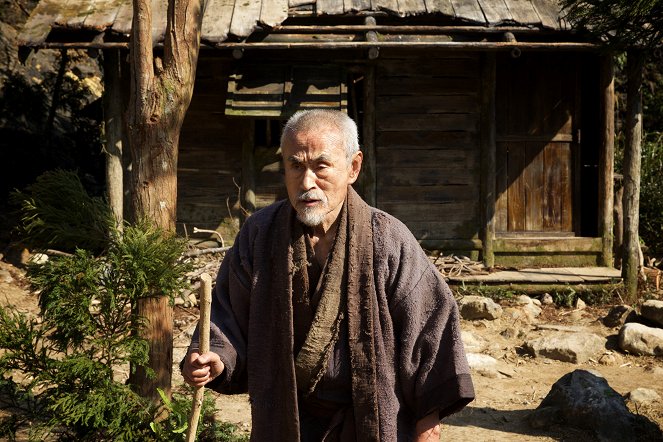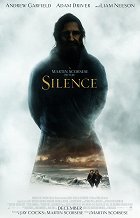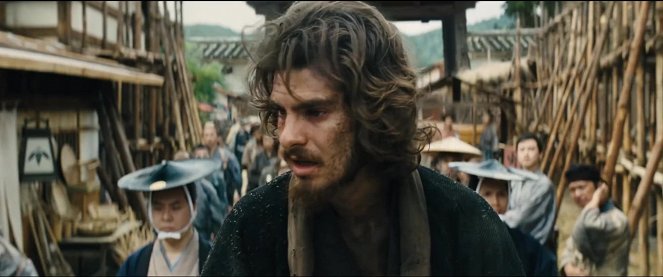Directed by:
Martin ScorseseCinematography:
Rodrigo PrietoCast:
Andrew Garfield, Adam Driver, Liam Neeson, 浅野忠信, Ciarán Hinds, Shin'ya Tsukamoto, Yōsuke Kubozuka, Ogata Issei, Hiroyuki Tanaka, Ryō Kase, 小松菜奈, 美知枝 (more)VOD (2)
Plots(1)
In the seventeenth century, two Jesuit priests face violence and persecution when they travel to Japan to locate their mentor and to spread the gospel of Christianity. (official distributor synopsis)
Videos (19)
Reviews (12)
I often give three stars to some crazy nonsense, but Silence is not nonsense. It just catches up to the fact that Scorsese, especially in his later years, can't work very well with visuals and imagery. A humble, slow, intimate, spiritual theme is not, in my opinion, ideal for stimulating with so many words, so many graphic shots that clearly explain what the scene is supposed to be about. As a result, the film breaks into four parts, where the first hour is like a cut from a TV Noe production (half-measured combo of quiet sensitivity and humility), which then breaks into classic sequences of abuse, during which we watch scene by scene the protagonist's breaking under various influences. This ends with part three, which is an essential dialogue with his teacher, and the rest of the film is a bad adaptation of the book in the style of a voice over saying "There were Dutch merchants in the harbor" and we have a shot of Dutch merchants. I completely understand Scorsese's fascination with the subject and his respect for it, but there's more of the subject than there is of the actual film and that's not how it’s supposed to be. I'll keep knocking on the door of The Revenant, McQueen, or Tarkovsky for religious movies. Those films may not be smart enough, but they have the potential to give the viewer more of a boost than the filmmakers themselves intended, which Silence doesn't have.
()
An artistic statement that is not as thought-provoking as The Last Temptation of Christ, yet it is a beautiful piece of filmmaking, thoughtful, with first-class visual compositions. My relationship with this film is ambivalent. The main characters – the Christian priests – didn’t have my sympathy because they were spreading the gospel in a culturally different country where no one asked them to (and where Buddhism was strongly rooted) and at the cost of immeasurable suffering for the common folk, bleeding and dying, but at the same time, this account of Scorsese as a deeply religious man is so honest that you have to admire it, even if you might be ideologically inclined in a different direction. Scorsese wanted more, to show that the people of the distant past deeply believed in symbols and that strongly rooted beliefs cannot be broken, no matter how hard the hostile environment tries. Everyone believes in something. Some believe in the power of nature, some in the power of family, others in the power of money, and Scorsese and other Christians in the power of the Christian God. And I, an ordinary person and a mere atheist, have no right to deny and question this belief. Although I will still side with Father Ferreira (Liam Neeson) and prefer the aforementioned The Last Temptation of Christ, which was deeper. PS: Garfield was brilliant. I was already intrigued by him already in The Social Network and I knew we would hear a lot about this guy.
()
I admire Martin Scorsese for reaching for matters of the heart without hesitation, even after audience-pleasing films like The Wolf of Wall Street or Shutter Island, knowing that it may not be successful commercially. And as is customary with matters of the heart, one reluctantly leaves out, limits, or shortens one's expectations. The fight for truth, against suffering, and with one's own ego, is portrayed in a way that is a destructive spectacle, thanks in large part to a phenomenal performance from Andrew Garfield. It raises a hundred and one questions, but mostly focuses on the same topic, which inevitably becomes tiresome even for the most accommodating viewer given the copious running time. Through Rodrigo Prieto's captivating camera work, Silence is visually stunning, but due to the sluggish screenplay, it is a bit challenging to engage in conversation about it.
()
One star for perfect cinematography, the rest fell victim to utter boredom and annoying Catholic propaganda. The answer to most of the questions asked by Father Rodrigues could be: "Because you came here forcing your delusions on us!" Fortunately, the Japanese did not make the same mistake as the Aztecs and Incas. They allowed the Catholics to become martyrs, thus avoiding the Conquista and the Holy Inquisition. The film was awfully long, and the story was so monotonous it dragged on like a snail soaked in honey. I wished the main characters a slow and painful death, and I was secretly hoping that one of the Japanese would finally run out of patience, reach for a katana and create a ‘pagan's cut,’ cutting the film shorter by at least a third.
()
After releasing masterfully crafted genre movies that won the favor of mass audiences, Martin Scorsese tried his hand at a more demanding project. And just like in The Last Temptation of Christ and Kundun, he turned his attention to religion. Built on dialogue, atmospheric shots of the given locations and subtle use of sounds, Silence is a slow film almost without any music. The structure is reminiscent of Coppola’s Apocalypse Now. Even as an atheist, I was surprised to enjoy the psychological analyses of the characters and the philosophical musings about the importance and consequences of faith, as well as the responsibility of its promulgators. Andrew Garfield is really, REALLY good.
()
Gallery (56)
Photo © Paramount Pictures



Ads